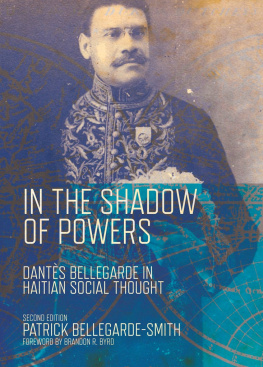IN THE SHADOW OF POWERS
Black Lives and Liberation
Brandon Byrd, Vanderbilt University
Zandria F. Robinson, Rhodes College
Christopher Cameron, University of North Carolina, Charlotte
series editors
Black Lives Matter. What began as a Twitter hashtag after the 2013 acquittal of George Zimmerman for the murder of Trayvon Martin has since become a widely recognized rallying cry for black being and resistance. The series aims are twofold: 1) to explore social justice and activism by black individuals and communities throughout history to the present, including the Black Lives Matter movement and the evolving ways it is being articulated and practiced across the African Diaspora; and 2) to examine everyday life and culture, rectifying well-worn histories that have excluded or denied the contributions of black individuals and communities or recast them as entirely white endeavors. Projects draw from a range of disciplines in the humanities and social sciences and will first and foremost be informed by peopled analyses, focusing on everyday actors and community folks.
IN THE SHADOW OF POWERS
DANTS BELLEGARDE IN HAITIAN SOCIAL THOUGHT
SECOND EDITION
PATRICK BELLEGARDE-SMITH
FOREWORD BY BRANDON R. BYRD
Vanderbilt University Press
Nashville
2019 by Vanderbilt University Press
Nashville, Tennessee 37235
All rights reserved.
This book is printed on acid-free paper.
Manufactured in the United States of America
Library of Congress Cataloging-in-Publication Data
Names: Bellegarde-Smith, Patrick, author. | Byrd, Brandon R., writer of preface.
Title: In the shadow of powers : Dants Bellegarde in Haitian social thought / Patrick Bellegarde-Smith ; foreword by Brandon R. Byrd.
Description: Second edition. | Nashville : Vanderbilt University Press, 2019. | Series: Black lives and liberation | Includes bibliographical references and index.
Identifiers: LCCN 2018046156| ISBN 9780826522269 (pbk. ; alk. paper) | ISBN 9780826522276 (ebook)
Subjects: LCSH: Bellegarde, Dants, 18771966Political and social views. | HaitiIntellectual life.
Classification: LCC F1927.B413 B45 2019 | DDC 972.94/05092dc23 LC record available at https://lccn.loc.gov/2018046156
ISBN 978-0-8265-2226-9 (paperback)
ISBN 978-0-8265-2227-6 (ebook)
For the twenty-two great-grand- and great-great-grandchildren of Dants Bellegarde:
Sasha Hagen, Myesha Gosselin, Brandon Bernier, Heaven Bernier,
Marie-Christine Ravix, Christelle Ravix, Alvin Wayne Smith, Jr.,
Ashlei Dolen, Gilbert Ravix, Karim Ravix, Keira Ravix, Loic Ravix,
Fritz Duroseau, Victoria Duroseau, Jean-Bernard Duroseau,
Louis-Philippe Duroseau, Thierry Malebranche, Sonia Malebranche,
Beatrice Malebranche, Kloe Chavannes, and Ailee Chavannes.
CONTENTS
by Brandon R. Byrd
ACKNOWLEDGMENTS
Earlier versions of portions of several chapters appeared variously in Caribbean Quarterly, 20, 304 (SeptemberDecember 1974), 2135, Haiti: Perspectives of Foreign Policy; An Essay on the International Relations of a Small State; Caribbean Studies 20, 1 (March 1980), 533, Haitian Social Thought in the Nineteenth Century: Class Formation and Westernization; Phylon 42, 3 (Fall 1981), 233244, Dants Bellegarde and Pan-Africanism; The Americas: A Quarterly Review of Inter-American Cultural History 39, 2 (October 1982), 167184, International/Social Theory in a Small State: An Analysis of the Thought of Dants Bellegarde.
Dants Bellegarde in full diplomatic regalia. The official portrait taken in 1921 for the embassy of the Republic of Haiti, Paris, France. Authors personal collection.
FOREWORD
I couldnt help saying to myself that that man would have brought $1,500 at auction in New Orleans in 1860 for stud purposes.
John Avery McIlhenny, 1917
Haiti has a great man whose years do not as yet number fifty but who has in that comparatively brief space of time become Haitian minister to France, Member of the Permanent Court of Arbitration of the Hague, Member of the Commission of Experts on Slavery and Forced Labor operating in connection with the Council of the League of Nations, Commander of the French Legion of Honor and international spokesman of the Negroes of the World.
W. E. B. Du Bois, The Crisis, April 1926
John Avery McIlhenny was the oldest son of the Confederate whose black workers invented Tabasco. He also was a well-known Democrat from Louisiana and the prototype of what passed for a southern gentleman. Schooled. White. Rich. All of which meant that he neednt mind his manners. Not around black people, at least.
In 1917, McIlhenny, then on his way to becoming the most powerful civilian official in U.S.-occupied Haiti,
That man was Dants Bellegarde.
To McIlhenny, the educated Haitian was as impossible as a sovereign Haiti. As the United States occupied the latter,and Jim Crow. Haitians, black people, McIlhenny thought he knew, were only as valuable as their bodies and manual labor, as the price that the market assigned or the profits they could produce. So, rather than engaging his Haitian counterpart in polite conversation, McIlhenny imagined him far removed from freedom and that moment and his seat at that table. He reduced Bellegarde from a superior black intellect to a blank canvas on which to paint his desires of racial domination.
The discursive enslavement of Dants Bellegarde was, in many ways, preordained by the histories of slavery and race that molded the American mind. Indeed, it was symptomatic of the history of Haiti, the black nation birthed in a slave revolution that had the peculiar characteristic of being unthinkable even as it happened.
Its almost trite to cite Michel-Rolph Trouillots now-famous argument about the conceptual impossibility of the Haitian Revolution. Nonetheless, it bears some repeating here. As Trouillot wrote more than two decades ago,
But categories did not exist to comprehend Haitians, either. By the nineteenth-century, most Europeans and Americans shared a worldview that associated whiteness with dominance and blackness with subordination. Their mental organization of the world emerged from and reinforced the geopolitical hierarchies made by the Transatlantic Slave Trade. It supported slavery, colonialism, and white imperialism. It did not account for the existence of Haitians, a black people who possessed their own country at a time when they were not meant to own their own bodies.
Put simply, the silencing of the Haitian Revolution entailed the erasure of Haitians. It encouraged the denial of Haitians agency as revolutionaries, statesmen, scholars, and soldiersas people, thinkers and doers, not commodities subject to the will of white buyers, sellers, and auctioneers.
Thomas Hart Benton was one of many who admitted as much. In defending the United States refusal to grant diplomatic recognition to Haiti, a policy that lasted from the end of the Haitian Revolution in 1804 until 1862, the U.S. senator from slaveholding Missouri insisted that his
So the discursive enslavement of Dants Bellegarde was, in a way, preordained and predictive. It, of course, predated the U.S. military occupation that stripped Haiti of its sovereignty from 1915 to 1934. But it also eroded any meaningful distinction between Benton and McIlhenny; between the racial ideologies that could and did arise from racial slavery and Jim Crow, white imperialism and the neocolonial order that Bellegarde would live to see become ascendant.












